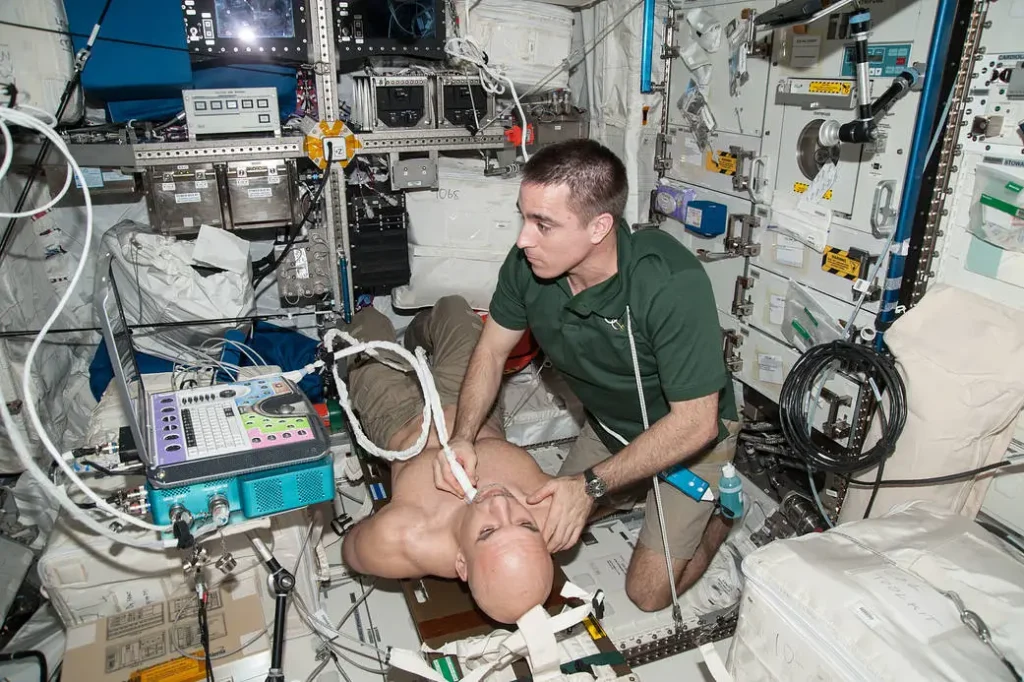Houston, Do We Have a Lawyer? The Legal Black Hole of Astronaut Health Care
It’s 2035. Halfway to Mars, a spacecraft’s chief medical officer collapses from a massive stroke. With Earth more than 50 million miles away, the crew scrambles for a telemedicine lifeline. Yet, amid this high-stakes emergency, questions remain: Who legally authorizes medical interventions? Whose medical license applies in outer space?

Published
Author
Share
It’s 2035. Halfway to Mars, a spacecraft’s chief medical officer collapses from a massive stroke. With Earth more than 50 million miles away, the crew scrambles for a telemedicine lifeline. Yet, amid this high-stakes emergency, questions remain: Who legally authorizes medical interventions? Whose medical license applies in outer space? And who bears liability for treatment outcomes when an astronaut’s health is on the line beyond Earth’s orbit and remote medical guidance fails?
As humanity pushes farther into the cosmos, our legal framework for space health care is stuck in the past—fragmented, outdated, and woefully inadequate. While astronauts do sign extensive liability waivers and informed consent forms before liftoff—which may limit lawsuits—these are patchwork, jurisdiction-bound contracts that do not provide blanket legal immunity and typically do not shield the agency from claims related to willful misconduct, or claims by a natural person for bodily injury or death. Critical areas like telemedicine liability, cross-border medical licensing, and mental health protection for astronauts still fall through the cracks of international law, leaving spacefarers in a legal black hole.
Outdated Space Treaties vs. Modern Medical Needs
Current international space laws were crafted during the Cold War’s rapid space-race era when missions were brief and Earth-centric. Today, as astronauts routinely face unforeseen delays, extending missions from weeks into months—even years—in orbit, these outdated laws crumble under pressure, offering only skeletal protections regarding astronaut health. These instruments emphasize rescue and return obligations for astronauts (“envoys of mankind,” as the treaties proclaim) but provide little direction on routine health care or long‐term medical management in space.
The foundational 1967 Outer Space Treaty, for instance, requires participating nations to render “all possible assistance” to astronauts in distress or emergency but remains silent on who must provide check-ups or therapy during a mission. The 1968 Rescue Agreement narrowly addresses astronaut emergencies during landings, excluding broader medical assistance. Even contemporary frameworks like the Artemis Accords simply echo these aged obligations without meaningful expansion, underscoring the inadequacy of current treaties for deep-space health care.
Modern medical challenges—from radiation-induced cancer risks to the physiological impacts of microgravity—demand regulations that extend beyond rescue protocols. Current treaties simply do not account for the possibility of advanced telehealth technologies or complex liability issues that may arise when a physician’s remote guidance is the only lifeline during a medical emergency in deep space.
The ISS: Patchwork Solutions in Orbit
Aboard the International Space Station (ISS), the partner agencies—National Aeronautics and Space Administration (NASA), European Space Agency (ESA), Canadian Space Agency (CSA), Russian Federal Space Agency (Roscosmos), and Japan Aerospace Exploration Agency (JAXA)—have established basic health rules. The ISS legal framework, comprised of the International Space Station Intergovernmental Agreement, MoUs and bilateral arrangements between partner agencies, and supplemented by a multilateral Code of Conduct, ensures a baseline of health and safety for crew members. National efforts, such as the TREAT Astronauts Act in the U.S. or the Health Beyond Initiative in Canada, as well as other efforts to modernize astronaut electronic health records, further seek to address the health care challenges faced by astronauts in deep space. Yet, these initiatives are limited to domestic application.
Thus, while the ISS regime shows that international cooperation on space medicine is possible, it is far from comprehensive. Each agency’s approach remains siloed, leaving protections for astronauts and the ultimate liability in case of a medical complication as fragmented as the national policies that currently govern them. Scholars have highlighted that while national laws and policies in major spacefaring states like the U.S. and Russia provide robust physical and psychological protections, these measures lack international cohesion—a problematic notion for multinational crew missions or when a spacecraft ventures far beyond the protective cocoon of the ISS.
Telemedicine Across Borders: Medical Miracle, Legal Nightmare
As missions extend beyond low Earth orbit, telemedicine is the linchpin of in-flight health care. In 2019, for instance, a telehealth program saved an ISS crew member’s life during a space station medical emergency: a blood clot.. As spacecraft venture farther from Earth, remote diagnostics, AI-driven monitoring, and real-time consultation become essential. The CSA’s Deep Space Health care Challenge represented an innovative step in this arena. It recently awarded prizes for AI-powered diagnostic and remote-treatment tools tailored for space medicine, underscoring telemedicine’s potential to revolutionize health care delivery beyond Earth.
Yet, as exciting as these innovations are, their deployment lacks essential legal scaffolding. Terrestrial telemedicine laws are confined by national borders. If a Canadian physician remotely guides surgery for an American astronaut on a Mars-bound mission, which legal jurisdiction (or medical license) would apply if a procedure goes wrong? In fact, no Earth-based medical license explicitly covers deep space—a glaring regulatory void that leaves both doctors and astronauts at risk.

An International Space Station crew member performs an onboard ultrasound exam with remote guidance from Earth, exemplifying telemedicine in space. Photo courtesy of NASA.
Mental Health: The Invisible Emergency
Beyond physical ailments, the psychological toll of space travel is profound. Extended isolation, confinement, and sensory deprivation can trigger depression, anxiety, and even cognitive decline. Recent studies warn that the risk of mental breakdowns will only intensify on missions beyond low Earth orbit.
Yet, existing treaties focus solely on physical rescue, leaving mental health support largely to the discretion of individual space agencies. Without binding international standards for psychological care, astronauts remain vulnerable to the “invisible” crisis of mental health deterioration—a risk that only increases as missions extend further from Earth.
The Final Frontier Needs Final Answers: Towards a Unified Legal Framework
The solution is not simply more treaties—it’s smarter, modernized regulations. Space-faring nations need an international legal pact dedicated explicitly to astronaut health care: a kind of Space Medicine Treaty with these critical elements:
- International Telemedicine Standards: Clarify jurisdiction, medical licensing, and liability when remote doctors guide space-bound procedures. Legislation like the TREAT Astronauts Act can serve as a foundation, but must be extended beyond national borders.
- Unified Medical Licensing for Space: Mutual recognition of “space medicine” credentials to protect both astronauts and health care providers.
- Explicit Mental Health Obligations: Clearly mandated psychological support, routine screenings, and legally protected rights to treatment or refusal.
- Cross-Border Liability and Insurance Schemes: Ensuring clear accountability and financial coverage when health care incidents occur far from Earth.
Astronauts venture into the cosmos as heroes; but they are also human beings. By proactively modernizing space law, we can plug the legal black holes that currently endanger our explorers. It’s time to turn the fragmented tapestry of national regulations into a cohesive global framework.
So before we launch the next Mars-bound crew, let’s ensure astronauts never have to ask: “Houston, do we have a lawyer?“


